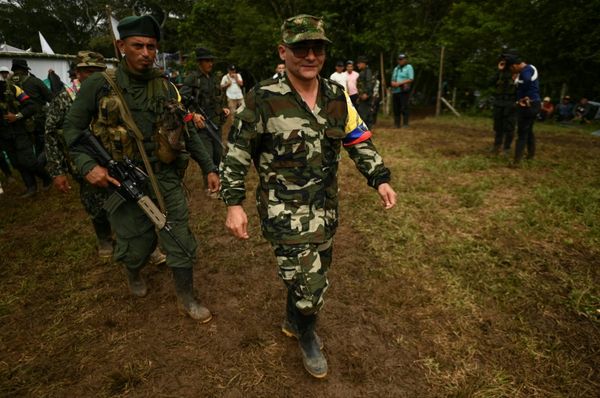
The race is officially on to become Donald Trump’s next national security adviser – but in this White House, the personalities and egos surrounding the president can matter far more than the titles they hold.
Speaking from Air Force One on Sunday evening, Trump suggested secretary of state Marco Rubio could continue to double-hat as the interim national security adviser. But he also praised Stephen Miller, whom he said was “at the top of the totem pole” for the appointment and said he was in effect already doing the job.
“I think he sort of indirectly already has that job … because he has a lot to say about a lot of things,” Trump said of Miller on board Air Force One. “He’s a very valued person in the administration, Stephen Miller.”
Rubio will have around six months to test drive the dual roles. “A lot of people say it really works in with what Marco is doing,” he said. “But we have a lot of people. I’m going to be naming somebody.”
The two men represent distinct wings of Trump’s Republican support: Rubio is a former rival who has tried to shapeshift into a Maga Republican, preserving his role in the Trump administration and potentially setting up a 2028 presidential run. Miller is a rightwing ideologue who has staked out a reputation as the administration’s driving hawk on immigration and a Trump enforcer among his top aides.
The fact that two men with such disparate backgrounds could both vie for the position indicates how the president relies more on the personalities around him than the positions they hold.
Mike Waltz was always the odd man out – a hawk who reportedly conspired with Benjamin Netanyahu on options to bomb Iran, and perhaps more importantly failed to jell with key Trump aides such as chief of staff Susie Wiles. Then there was Signalgate, when Waltz accidentally added the Atlantic’s Jeffrey Goldberg into a top-level group chat discussing strikes against Yemen’s Houthis.
The country’s national security adviser is tasked with briefing the president and coordinating discussions among the key foreign policy and national security advisers. While Henry Kissinger famously served as secretary of state and national security adviser for two years during the Vietnam war, that was 50 years ago and there are doubts that Rubio can both travel the world as the US’s top diplomat and also fulfill a role where he should be attached to Trump’s hip at the White House.
“If Rubio is going to maintain his role as secretary of state, there is absolutely no way for him to do both jobs sustainably,” said Edward Price, a former senior adviser to secretary of state Antony Blinken who also served on the national security council. “2025 is not 1975 [when Henry Kissinger served in both roles] in terms of the issues that the foreign policy establishment has to deal with and running a department of 80,000 people and being the nation’s top diplomat should be more than a 24/7 job.
“If it’s not, you’re you’re not doing it right,” he said.
The role of national security adviser “really can’t be performed by someone who’s also got a cabinet department to run”, said John Bolton, Trump’s former national security adviser during his first term, in a CNN interview.
Miller is among the most ardent members of the Maga wing of Trump’s coterie. While he mainly focuses on domestic issues – in particular curating the government’s aggressive anti-immigration policy – he has also matched the president’s skepticism of Ukraine and his pro-Israel policies as well, particularly regarding the crackdown on anti-war protestors in the United States.
But more importantly, he has proven himself as a powerful enforcer in the administration.
The leaked transcripts of the Signal chats among top officials showed that Miller effectively cut off a discussion of whether or not the timing was right to strike the Houthis in Yemen by citing the desires of the president. “As I heard it, the president was clear: green light, but we soon make clear to Egypt and Europe what we expect in return,” he wrote, prompting defense secretary Pete Hegseth to respond: “Agree.”
Many took that to signal his weight in the administration. “I think that Signal chat is exhibit A,” said Price. “He goes in there and speaks on an issue that, as homeland security Adviser and deputy chief of staff, really shouldn’t be clearly within his purview.” He said “the president has spoken, and this is what he said, and this is what we’re going to do. And everyone sort of got in line, and, you know, it’s clear that he’s the power center of this White House.”
That matters far less than policy bonafides, of which Miller has few when it comes to US foreign policy. “Miller’s a very bright person, no one should underestimate him,” said Bolton. “If he were to become national security adviser, you would have a clear merging of the homeland and national security adviser jobs … but it’s hard to see what [he] would contribute to discussions on national nuclear weapons strategy.”







